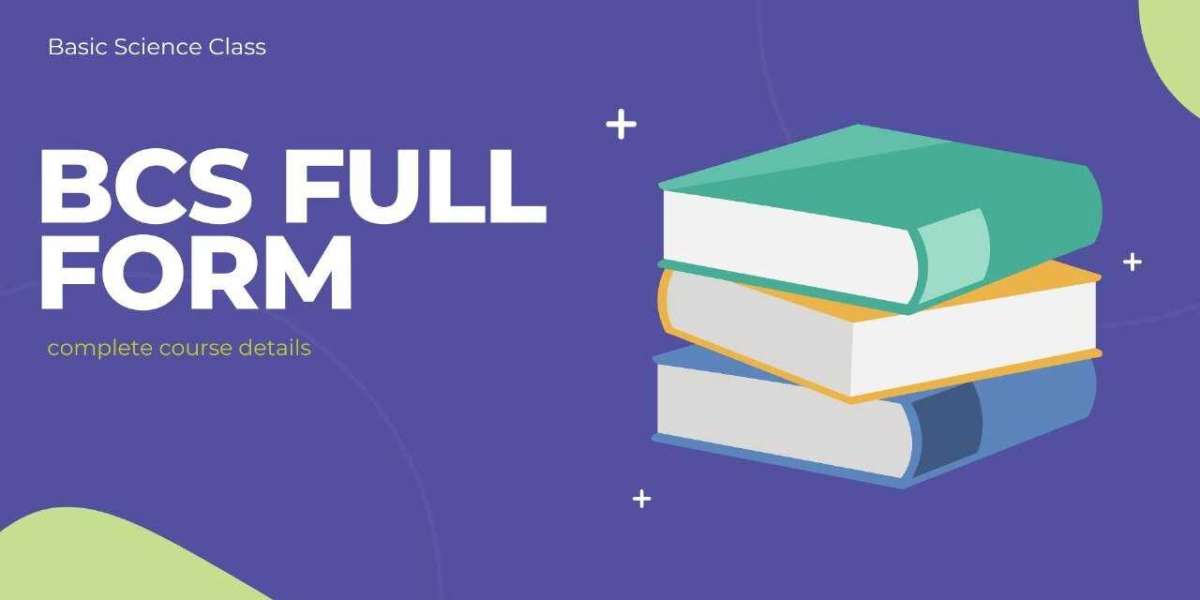In a world increasingly driven by technology, the importance of computer science cannot be overstated. The Bachelor of Computer Science ("https://universitychalo.com/course/bachelor-of-computer-science-bcs">BCS) degree stands out as one of the most significant academic paths for individuals looking to delve into the world of computing and technology. This article aims to provide a comprehensive understanding of the BCS full form, its curriculum, career prospects, and why it is a valuable choice for aspiring computer scientists.
BCS Full Form: Bachelor of Computer Science
The full form of BCS is "Bachelor of Computer Science." It is an undergraduate degree program designed to provide a deep understanding of computational theories, programming, and the application of computer science principles in solving real-world problems. Spanning three to four years depending on the country or institution, the program is tailored to develop skilled professionals ready to tackle the challenges of the tech-driven era.
What is the Bachelor of Computer Science Degree?
The Bachelor of Computer Science is a rigorous academic program focusing on the study of algorithms, programming languages, software engineering, and systems design. It is well-suited for students passionate about technology and innovation.
Core Features of the Program
Comprehensive Curriculum:
Programming languages (C, Java, Python, etc.)
Data Structures and Algorithms
Artificial Intelligence (AI) and Machine Learning (ML)
Database Management Systems (DBMS)
Operating Systems and Networking
Cybersecurity and Cryptography
Hands-On Experience: Students participate in laboratory sessions, internships, and project-based learning to apply theoretical concepts to practical scenarios.
Research and Innovation: Many programs encourage research projects, enabling students to contribute to advancements in computer science.
Electives and Specializations: Elective courses allow students to specialize in areas like cloud computing, data analytics, or robotics.
Eligibility Criteria for BCS
To enroll in a BCS program, candidates generally need to:
Complete 10+2 (or equivalent) education with a focus on Mathematics and Science.
Achieve a minimum aggregate score of 50-60% in their qualifying exams.
Pass entrance examinations (if applicable), which assess aptitude in mathematics, logic, and problem-solving.
Structure and Curriculum
Year 1: Foundational Knowledge
In the first year, students are introduced to the basics of computer science:
Introduction to Computing
Fundamentals of Programming
Discrete Mathematics
Computer Organization and Architecture
Year 2: Intermediate Topics
The second year focuses on building technical expertise:
Data Structures and Algorithms
Object-Oriented Programming
Operating Systems
Software Development Practices
Year 3: Advanced Learning and Applications
In the final year(s), students explore advanced topics and applications:
Artificial Intelligence and Machine Learning
Big Data and Cloud Computing
Cybersecurity and Ethical Hacking
Capstone Project or Thesis
Why Pursue a Bachelor of Computer Science?
1. High Demand for Skills:
The IT sector continues to expand, creating a strong demand for skilled professionals.
2. Diverse Career Opportunities:
Graduates can work in various domains, including software engineering, data science, cybersecurity, and more.
3. Foundation for Advanced Studies:
The BCS program is an excellent precursor to advanced studies such as Master’s or PhD programs in Computer Science or related fields.
4. Lucrative Salaries:
Roles in computer science are often associated with high earning potential due to the specialized skills they require.
Career Opportunities for BCS Graduates
1. Software Engineer:
Develop, test, and maintain software applications.
Work with programming languages and software development frameworks.
2. Data Scientist:
Analyze large datasets to derive meaningful insights.
Utilize tools like Python, R, and SQL for data analysis.
3. Cybersecurity Analyst:
Protect systems and networks from digital threats.
Implement security protocols and conduct vulnerability assessments.
4. Systems Architect:
Design and oversee the implementation of computer systems and networks.
5. Artificial Intelligence Specialist:
Work on AI-based solutions, including natural language processing and machine learning algorithms.
6. Web Developer:
Design and develop websites and web applications with a focus on user experience.
7. Game Developer:
Create interactive video games using programming and design skills.
Challenges in the Field of Computer Science
While the BCS degree offers numerous opportunities, it also comes with its challenges:
1. Rapid Technological Advancements:
Staying updated with emerging technologies requires continuous learning.
2. High Competition:
The popularity of computer science means graduates must differentiate themselves with unique skills and experiences.
3. Balancing Theory and Practice:
Mastering both theoretical knowledge and its practical application can be challenging.
Higher Education After BCS
1. Master of Computer Science (MCS):
A postgraduate program offering advanced knowledge in specialized fields.
2. MBA in Technology Management:
Combines technical expertise with business acumen for leadership roles.
3. Specialized Certifications:
Certifications in fields like cloud computing, cybersecurity, or data analytics can boost employability.
4. Research Opportunities:
Pursuing a PhD allows graduates to contribute to cutting-edge research and innovations.
Global Opportunities
BCS graduates are in demand worldwide, with opportunities to work in tech hubs like Silicon Valley, Bangalore, and Singapore. Global exposure enhances learning and career growth.
Entrepreneurial Opportunities
A BCS degree equips students with the skills to start their ventures. Potential entrepreneurial paths include:
1. Software Development Startups:
Providing innovative software solutions.
2. IT Consulting Firms:
Helping businesses optimize their technology infrastructure.
3. Tech Product Companies:
Building hardware or software products to address market needs.
Conclusion
The BCS full form—Bachelor of Computer Science—represents a degree that is more than just academic achievement; it is a launchpad to a dynamic and rewarding career. With its emphasis on foundational and advanced knowledge, practical application, and innovation, the BCS program prepares students to excel in the fast-evolving tech landscape.
By understanding the nuances of the BCS curriculum and staying proactive about skill development, graduates can unlock a world of opportunities. Whether aiming for a corporate role, pursuing research, or launching a startup, a BCS degree equips individuals with the tools they need to succeed in the ever-expanding realm of computer science.








